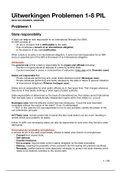Samenvatting
Volledige samenvatting probleem 1-8 + HC | Public International LAW | RR314 | B3 | Erasmus Universiteit Rotterdam |
- Instelling
- Erasmus Universiteit Rotterdam (EUR)
In deze samenvatting heb ik alle problemen compleet uitgewerkt met alle vereiste literatuur en jurisprudentie die is voorgeschreven. Door de problemen heen zijn de aantekeningen van het HC verweven.
[Meer zien]





